小学英语一般疑问句和特殊疑问句总结
小学英语四种基本句型-肯定句、否定句、一般疑问句与特殊疑问句
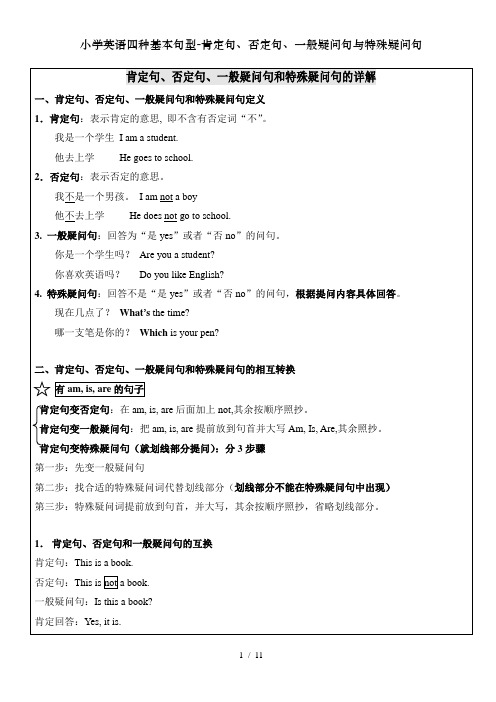
3 / 11
小学英语四种基本句型-肯定句、否定句、一般疑问句与特殊疑问句 特殊:
1.some 变为 any There are some birds in the tree.→There aren't any birds in the tree. 但是,若在表示请邀请、请求的句子中,some 可以不变。 Would you like some orange juice? 与此相关的一些不定代词如 something, somebody 等也要进行相应变化。
2.就划线部分提问(变特殊疑问句) I like English. 第一步:先变一般疑问句 Do you like English? 第二步:找合适的特殊疑问词代替划线部分 Do you like what? 第三步:特殊疑问词提前放到句首,并大写,其余按顺序照抄,省略划线部分。 What do you like?
类别 陈述句
疑问句
用法
标点
肯定 叙述一件事情或 说明说话人的看法 .
否定
一般 用于提出问题
?
特殊 用于提出问题
?
例句 This is a bag. That's my book. I can see a bag over there. I don't know. Are you a student? Do you like puppets? Can you speak English? What's your name? Where's my bag? How many trees are there?
1. 肯定句、否定句和一般疑问句的互换 肯定句:This is a book. 否定句:This is not a book. 一般疑问句:Is this a book? 肯定回答:Yes, it is.
小学英语特殊疑问句和一般疑问句地归纳

特殊疑问句和一般疑问句的答法一般疑问句通常都是 1..以be (am,is,are,)开头2.以Do,Does,Did 开头或以Can开头回答方法:前面用什么提问的就用什么答。
只有两种回答方式:1)肯定的, Yes,主语 + 提问词.2)否定的 No,主语+提问词+not.【注意:问句与答句的第一二人称要互换】如:④主语是名字时的答语:看性别,男的用he ,女的用she ,其他的用it 复数就用they。
如:①Is she……? Is he………? Is it……..?Yes, she is. Yes, he is. Yes, it is.No, she isn,t. No, he isn,t. No, it isn,t.②Are they………? Are the monkeys …….?Yes, they are. Yes, they are.No,they aren’t No,they aren’t③ Do they………? Does he……..? Did she…….?Yes,they do. Yes,he does. Yes, she did.No,they don’t. No,he doesn’t. No,she didn’t.④Are you……..? Are you……..? Do you…….?Yes, I am. Yes, we are. Yes ,I do. 或 Yes,No, I am not. No, we aren’t. No,I don’t. 或No,⑤Does Mike…….? Is ChenJi…..? Do your parents…?Yes ,he does. Yes , she is. Yes, they do.No,he doesn’t. No, she isn’t. No,they don’t.一、专项练习。
1. Did ChenJie read books yesterday?2. Can the girl cook the meals ?—————————————————————————————3.Is he going to swim this afternoon?4. Are they going to take a trip next weend? ————————————————————————————————5.Does he often go to school by bike ? 6. Do you play basketball every weekend? ———————————————————————————————————7. Did Mike do his homework yesterday? 8. Are they playing basketball now?————————————————————————————————一般疑问句及特殊疑问句的总结一般疑问句的定义:用yes或no来回答的疑问句叫一般疑问句。
一般疑问句、特殊疑问句、选择疑问句、反义疑问句地详细用法
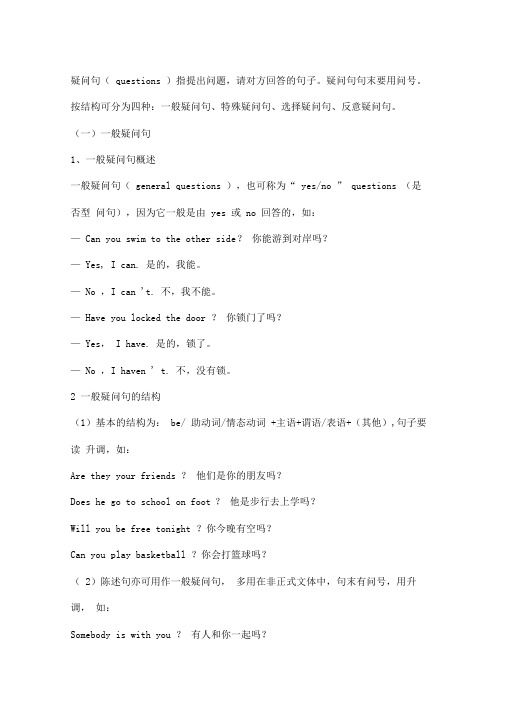
疑问句( questions )指提出问题,请对方回答的句子。
疑问句句末要用问号。
按结构可分为四种:一般疑问句、特殊疑问句、选择疑问句、反意疑问句。
(一)一般疑问句1、一般疑问句概述一般疑问句( general questions ),也可称为“ yes/no ” questions (是否型问句),因为它一般是由 yes 或 no 回答的,如:— Can you swim to the other side ?你能游到对岸吗?— Yes, I can. 是的,我能。
— No ,I can 't. 不,我不能。
— Have you locked the door ?你锁门了吗?— Yes, I have. 是的,锁了。
— No ,I haven ' t. 不,没有锁。
2 一般疑问句的结构(1)基本的结构为: be/ 助动词/情态动词 +主语+谓语/表语+(其他),句子要读升调,如:Are they your friends ?他们是你的朋友吗?Does he go to school on foot ?他是步行去上学吗?Will you be free tonight ?你今晚有空吗?Can you play basketball ?你会打篮球吗?( 2)陈述句亦可用作一般疑问句,多用在非正式文体中,句末有问号,用升调,如:Somebody is with you ?有人和你一起吗?He didn ' t finish the work ?他没有做完活吗?You are fresh from America , I suppose ?我猜,你刚从美国回来吧?3、一般疑问句的答语( 1)一般疑问句一般由 yes 或 no 来回答,如:— Are you tired ?你累了吗?— Yes,I am. 是的 ,累了。
— No, I ' m not. 不,不累。
— Does she do the cleaning ?她扫除了吗?— Yes , she does. 是的,她打扫了。
小学英语特殊疑问句和一般疑问句的归纳

特殊疑问句和一般疑问句的答法一般疑问句通常都是 1..以be (am,is,are,)开头2.以Do,Does,Did 开头或以Can开头回答方法:前面用什么提问的就用什么答。
只有两种回答方式:1)肯定的, Yes,主语 + 提问词.2)否定的 No,主语+提问词+not.【注意:问句与答句的第一二人称要互换】如:④主语是名字时的答语:看性别,男的用he ,女的用she ,其他的用it 复数就用they。
如:①Is she…… Is he……… Is it……..Yes, she is. Yes, he is. Yes, it is.No, she isn,t. No, he isn,t. No, it isn,t.②Are they……… Are the monkeys …….Yes, they are. Yes, they are.No,they aren’t No,they aren’t③ Do they……… Does he…….. Did she…….Yes,they do. Yes,he does. Yes, she did.No,they don’t. No,he doesn’t. No,she didn’t.④Are you…….. Are you…….. Do you…….Yes, I am. Yes, we are. Yes ,I do. 或 Yes,No, I am not. No, we aren’t. No,I don’t. 或No,⑤Does Mike……. Is ChenJi….. Do your parents…Yes ,he does. Yes , she is. Yes, they do.No,he doesn’t. No, she isn’t. No,they don’t.111v1.0 可编辑可修改一、专项练习。
1. Did ChenJie read books yesterday2. Can the girl cook the meals—————————————————————————————he going to swim this afternoon 4. Are they going to take a trip next weekend ————————————————————————————————5.Does he often go to school by bike 6. Do you play basketball every weekend ———————————————————————————————————7. Did Mike do his homework yesterday 8. Are they playing basketball now————————————————————————————————一般疑问句及特殊疑问句的总结一般疑问句的定义:用yes或no来回答的疑问句叫一般疑问句。
小学英语四种基本句型肯定句否定句、一般疑问句与特殊疑问句
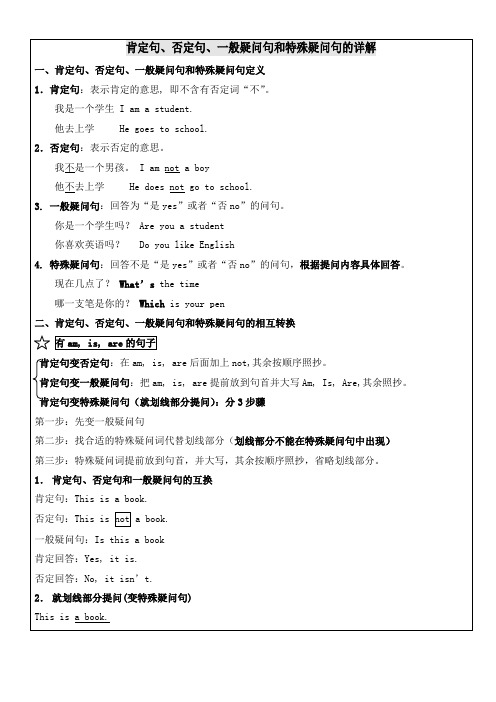
第一步:变一般疑问句 Is this a book
第二步:找合适的特殊疑问词 Is this what
第三步:特殊疑问词提前放到句首,并大写,其余按顺序照抄,省略划线部分。What is this
没有 am, is, are 的句子
肯定句变否定句:在主语后面加上 do not 或者 does not,其余按顺序照抄动词用原形
how many 多少 问数量
why 为什么 问原因
how much 多少 问价钱
what 什么 问东西
how about …怎么样 问意见
what time 什么时间 问时间 how far 多远 问路程
what colour 什么颜色 问颜色 how long 多长 问时间
what about…怎么样 问意见 How soon 多快,多久 问时间
what day 星期几 问星期
How often 多久 问频率
三.句子的种类
类别 陈述句
疑问句
用法 肯定 叙述一件事情或
说明说话人的看法
否定
标点 .
一般 用于提出问题
特殊 用于提出问题
例句 This is a bag. That's my book. I can see a bag over there. I don't know. Are you a student Do you like puppets Can you speak English What's your name Where's my bag How many trees are there
1.肯定句、否定句和一般疑问句的互换
非单三时用 do, 单三时用 does
小学英语四种基本句型肯定句否定句、一般疑问句与特殊疑问句
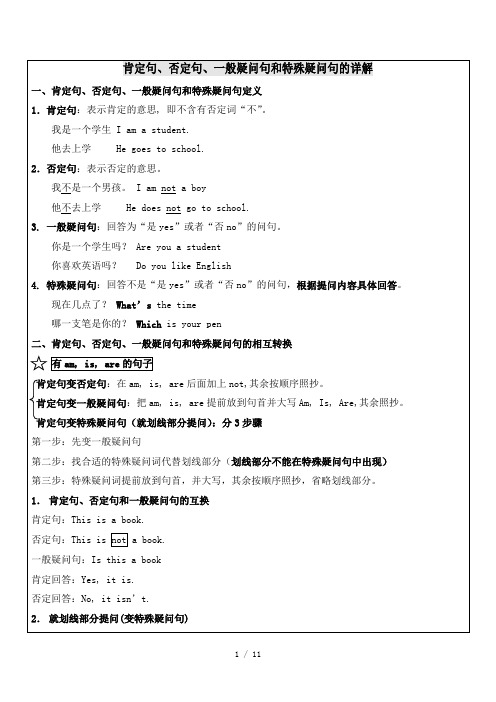
3、A: _______ is the diary???????????? B:It’s under the chair. 4、A: _______ is the Chirstmas Day???? B: It’s on the 25th of December. 5、A: _______ are the earphones????????B:They are 25 yuan. 6、A: _______ is the hairdryer??????????B:It’s blue. 7、A: _______ is it today??????????????B:It’s Sunday. 8、A: _______ was it yesterday???????? B: It was the 13th of October. 9、A: _______ this red one????????????B:It’s beautiful. 10、A: _______ is it from here???????? B:It’s about two kilometres away. 11、A: Can I have some paper and some crayons
常用特殊疑问词及词组:
when 什么时间(问时间)
what date 什么日期 问具体日期
who 谁(问人)
what place 什么地点问具体地址
whose 谁的 问主人
how …怎么样 问情况
2 / 11
where 在哪里 问地点 which 哪一个 问选择 why 为什么 问原因
how old 多大 问年龄 how many 多少 问数量 how much 多少 问价钱
1 / 11
小学英语重点疑问句归纳
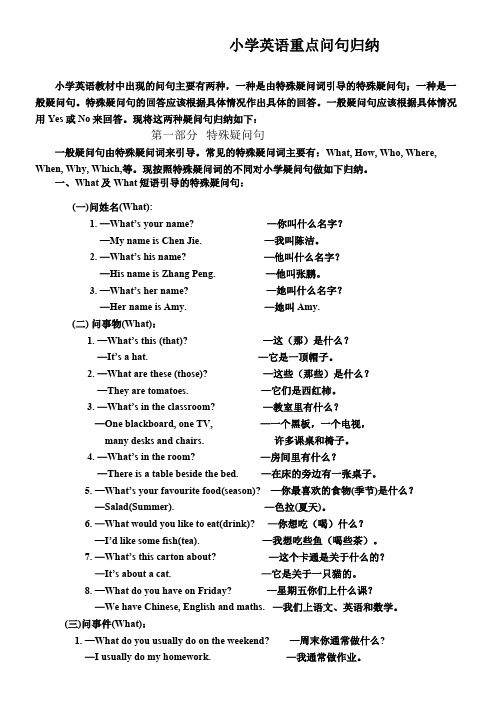
小学英语重点问句归纳小学英语教材中出现的问句主要有两种,一种是由特殊疑问词引导的特殊疑问句;一种是一般疑问句。
特殊疑问句的回答应该根据具体情况作出具体的回答。
一般疑问句应该根据具体情况用Yes或No来回答。
现将这两种疑问句归纳如下:第一部分特殊疑问句一般疑问句由特殊疑问词来引导。
常见的特殊疑问词主要有:What, How, Who, Where,When, Why, Which,等。
现按照特殊疑问词的不同对小学疑问句做如下归纳。
一、What及What短语引导的特殊疑问句:(一)问姓名(What):1. —What’s your name? —你叫什么名字?—My name is Chen Jie. —我叫陈洁。
2. —What’s his name? —他叫什么名字?—His name is Zhang Peng. —他叫张鹏。
3. —What’s her name? —她叫什么名字?—Her name is Amy. —她叫Amy.(二) 问事物(What):1. —What’s this (that)? —这(那)是什么?—It’s a hat. —它是一顶帽子。
2. —What are these (those)? —这些(那些)是什么?—They are tomatoes. —它们是西红柿。
3. —What’s in the classroom? —教室里有什么?—One blackboard, one TV, —一个黑板,一个电视,many desks and chairs. 许多课桌和椅子。
4. —What’s in the room? —房间里有什么?—There is a table beside the bed. —在床的旁边有一张桌子。
5. —What’s your favourite food(season)? —你最喜欢的食物(季节)是什么?—Salad(Summer). —色拉(夏天)。
一般疑问句和特殊疑问句的用法、结构、回答详细总结归纳

一般疑问句和特殊疑问句的结构、用法、回答详细总结讲解唐赳学英语,必须弄懂英语最基本的两种疑问句,即:一般疑问句和特殊疑问句。
一、一般疑问句一般疑问句是疑问句的一种。
它是指用yes(是)或no(不是)来回答的句子。
翻译成汉语,凡是句末都带有“吗?”的疑问句都是一般疑问句。
1、一般疑问句的总体基本结构:其结构是:系动词be / 助动词/情态动词+主语+其他成分+?如:Are you a student? 你是学生吗?2、一般疑问句的回答方式:肯定回答:Yes,主语+提问的be/助动词/情态动词.如上句:Are you a student? 你是学生吗?肯定回答就是:Yes, I am. 是的,我是。
否定回答:No,主语+提问的be / 助动词/ 情态动词的否定形式(not).如上句:Are you a student? 你是学生吗?否定回答就是:No, I am not.3、英语中的一般疑问句分为两种主要的形式:第一大类:为含有be动词(is am are,was, were)或情态动词的一般疑问句,其结构为:be+主语+其它部分+?情态动词+主语+动词原形+其它部分+?肯定回答用“Yes,主语+be \ 情态动词.”,否定回答用“No,主语+be \ 情态动词+not.”。
be或情态动词和not可用缩写形式,主要有isn’t,aren’t,wasn’t,weren’t,can’t,mustn’t,needn’t等。
例1:Is this your English book?这是你的英语书吗?肯定回答:Yes,it is. 是的,它是(我的)。
否定回答:No,it isn`t. 不,它不是(我的)。
例2:Are these your English books?这些是你的英语书吗?肯定回答:Yes,they are. 是的,它们是。
否定回答:No,they aren’t.不,它们不是。
例3: Can you speak English? 你能讲英语吗?(本句式含有情态动词can 的一般疑问句)肯定回答:Yes,I can. 是的,我能。
- 1、下载文档前请自行甄别文档内容的完整性,平台不提供额外的编辑、内容补充、找答案等附加服务。
- 2、"仅部分预览"的文档,不可在线预览部分如存在完整性等问题,可反馈申请退款(可完整预览的文档不适用该条件!)。
- 3、如文档侵犯您的权益,请联系客服反馈,我们会尽快为您处理(人工客服工作时间:9:00-18:30)。
小学语法之疑问句
一、一般疑问句
1、定义: 用Yes 或No 作答的疑问句叫一般疑问句。
2、特点:1、以be动词、助动词或情态动词开头;例:Is your father a teacher? Does Tom like apples? Can Jenny speak English?2 、句末读升调
3、肯定陈述句变一般疑问句的方法:
1> 看句中有无be 动词(am、is、are、was、were )或情态动词(can ),如
果有,将其提到句首,句末加问号。
例:It was rainy yesterday.
T Was it rainy yesterday?
Tom's father can play the piano.
t Can Tom's father play the piano?
2>如果句中没有be 动词或情态动词,主语前加助动词(一般现在时do、does、一般过去时d i d ),且原句的谓语动词要变回原形。
1. They go to school by bike. t Do they go to school by bike?
2. Bill gets up at 6:30 every day. t Does bill gets up at 6:30 every day?
3. The students saw a film yesterday. t Did the students see a film yesterday?
注:1.如果陈述句中有第一人称,则变问句时要变为第二人称。
I usually have lunch at school. t Do you usually have lunch at chool?s
2. 如果陈述句中有some, 则变问句时往往要变成any 。
There is some water on the playground. t Is there any water on the playground 4. 一般疑问句的回答:
肯定回答Yes,主语+ be/can/ do , does,did
否定回答No, 主语+ be/can/ do ,does,did 的not 否定形式缩写.。
例:Does she clean her room every day? Yes, she does.
Is Anna ' s father a doctor? , Nohe isn ' t.
Can she dance? Yes,she can..
如果问句主语是this that,回答时用it代替;若问句主语是these, those,回答时用they 代替。
--Is this your bag?
--Yes, it is ./ No, it isn ' t.
--Are those your books?
--Yes, they are/. No, they aren ' t.
练习:
1. His father was an English teacher.
2. These cats are crying.
3. They can swim.
4. I went to school on foot.
5. His father goes to work by bus.
6. Mrs. Li and Kitty can sing English songs..
7. Kitty is wearing her new uniform.
8. The two boys under the tree were hungry.
9. Mrs. Li and Kitty watch television at night.
10. I can finish my homework by myself.
11. I have some good friends.
12. They cleaned their rooms and finished their homework yesterday.
二、特殊疑问句
1、定义:以疑问词开头,对句中某一成分提问的句子叫特殊疑问句。
构成:特殊疑问词+一般疑问句
常用的疑问词有:What (什么),why(为什么),who(谁),where(哪里),which (哪
一个),what class(什么课),what time(什么时间),what number(什么号码);how(怎么样),how many(多少),how old(多大),how much(多少
2、语序:
1.如疑问词作主语或是对主语提问,其语序是陈述句的语序:疑问词+谓语动
词+其他成分?
女口:1)Who is si ngi ng in the room ? 2)Where is he?
2.如疑问词作其他成分,即对其他成分提问,其语序是:疑问词+—般疑问句?如:1)what class are you in ? 2)What does she look like ?
注:回答特殊疑问句时,问什么答什么。
不用yes / no。
女口:Where's the restaura nt ? It is n ear the stati on .
3、特殊疑问句都要读成降调(\),并往往让最后一个单词承担此重任。
练习
一、选择正确的单词填空
(who, where, whe n,what)
2. They are un der the tree.
3.I ofte n watch TV after dinner.( 晚饭后)
4. Lily swims in the swimming pool.( 游泳池 )
5.Superman flies in the sky.
6.1 ofte n brush my teeth in the eve ning.
7.
Alan likes playing with Bill. 1. ____ is that pretty girl?
2. ____ are Jack and Tom?
3. ____ do you go to school?
4. ____ has a beautiful flower?
5. ____ are they doing?
6. ____ is my mother?
7. ____ are you going to do tomorrow?
8. ____ do Jim and Wendy play ball?
9. -------- does he have for breakfast?
She is my sister. They are behi nd you. I go to school from Mon day to Friday. John has a beautiful flower. They are clea ning their rooms. She is in the livi ng room.
We are going to swim.
They play ball in the after
noon.
He has milk and bread. 10. ____ are you from?
二、就画线部分提问 1. He is my father.
rm from Chan gch un city.
8. The supermarket is n ear the school.
9. Je nnifer has a pair of earri ngs(耳环).
10. The flowers are in the flower pot(花盆).
11. The mon key sleeps at ni ght 检.查。
